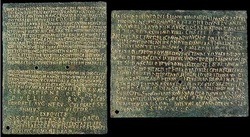Imperial Administration

The lasting effects of the Roman Empire on our modern day world and the empires in the classical era were mainly because Rome’s imperial administration, legal systems, military power, promotion of trade and economic integration. Rome’s imperial administration progressively changed throughout the time in which the empire lasted. Rome went from being a representative republic, in which the governing body consisted of the senate and the assembly along with two consuls, to an imperial Empire in which one ruler, such as Julius Caesar and Octavius, lead the people. This change had a huge impact on the roman people, since every human in the empire had a right to be represented in the representative republic, and once the switch was made to imperialism, the people had their decisions made by one person who represents the empire as a whole. Even in the households themselves, the idea that one main person leads the household took place as well. To Roman families believed in a pater familias, which means that the head of the house is the eldest male of the household. The roman legal system was most alike to our present day legal system today. The idea of court systems originated in the Roman Empire, and the idea that one is innocent until proven guilty also stems its roots to the Roman Empire. The Roman’s also followed a rule system referred to as the twelve tables of Rome, which are considered to be very similar to our Bill of Rights. Through this code of law, the people had a feeling of fairness and were to be ensured a fair trial in court.
